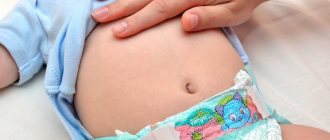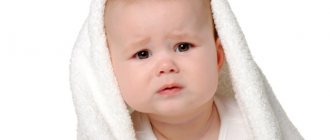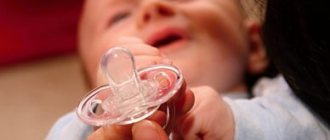Home Ι Flatulence
A newborn child, especially if he is the first in the family, often surprises young parents and confuses them.
with its own characteristics. Adults have a good idea of how an “adult” body functions, but a baby is not a smaller copy of an adult, and his body still works according to different laws. For example, new mothers may be concerned that their baby farts and poops many times a day. Let's try to figure out whether there is any reason for concern.
Causes of bloating
Most often, disturbances in the digestive system begin with bloating. As a result, the child begins to fart frequently. Let's look at the most common reasons.
Maternal nutrition
The diet of an infant depends solely on the diet of the mother. If a nursing mother prefers to eat hot spices, legumes or nuts, then most likely this is the reason for her baby’s bloating. Moreover, the passage of gases may be difficult for more than one day, and it will be possible to notice that the baby is straining.
Adaptation of the infant's stomach
The child's body does not immediately get used to digesting food. On the first day of life, his intestines are practically sterile. Even mother's milk is a complex product. That's why gases are formed.
Feeding formulas
The formula for each child must be selected individually. It often happens that the chosen food is not suitable for the baby. This is what causes gas formation. The child farts a lot, sometimes even screams loudly because his tummy hurts.
Difficulty emptying
If a newborn cannot poop for a long time, he strains and farts a lot, which stimulates the intestines.
How to identify bloating in a baby?
When an adult’s stomach is bursting, he feels it and can describe his feelings in words. The baby cannot yet complain, feeling discomfort, he screams and cries.
The easiest way to determine whether a child is suffering from flatulence is to lay him on his back on a hard surface and feel his stomach. A healthy baby has a soft tummy. The accumulation of gases, on the contrary, makes it elastic, sometimes even hard.
The reason for palpation may be the child’s anxiety and crying, but after the gases are removed, the baby immediately calms down. This makes it possible to distinguish flatulence from other diseases that also cause concern in newborns.
When to be wary
But often young parents turn to the pediatrician with the problem of excessive gas formation in the baby, accompanied by an unpleasant odor, gas, and the appearance of colic. The following signs indicate that gas formation is not normal:
- the child behaves restlessly;
- anxiety manifests itself despite the fact that the baby is full and his clothes are dry;
- the baby constantly pulls his legs to his chest and pushes;
- the baby often screams or cries for no apparent reason;
- anxiety is especially evident after feeding;
- the child farts little or has stopped doing so altogether;
- The baby has a hard belly.
If gas cars smell stinky, this may be a consequence of constipation or diarrhea. And that means the child needs help.
What are the symptoms to tell that a newborn has gas?
It is quite simple to understand that a child is suffering from flatulence. The most obvious signs that indicate that the stomach hurts:
- The accumulation of gases bursts the baby's tummy, this is accompanied by pain. The baby begins to kick his legs, clenches his fists, and cries a lot. This usually happens after feeding.
- A crying child, who is tormented by gas trucks, has to be rocked in his arms all night. He falls asleep for a short time, then wakes up again. The pain occurs in attacks, so the baby calms down for a short time, and then begins to act up again.
- Gases in newborns swell the intestines and, as a result, the abdomen. It increases in size and becomes hard.
- Gas formation is combined with stool problems: constipation or diarrhea.
- A sign of rapid gas formation is belching. This is the most harmless way to remove gases from the intestines. However, frequent belching indicates that there is too much gas.
Unpleasant smell
The release of gases with an unpleasant odor is explained by the fact that the baby’s gastrointestinal tract is still in the process of formation and does not contain the bacteria necessary for the absorption of food. This is why food begins to ferment or rot – the causes of unpleasant odors. After the intestinal microflora is normalized, the unpleasant odor disappears.
Sometimes parents discover that the child himself has stopped smelling farts. But this does not mean that you can do nothing, take no measures. It is worth consulting with a specialist, he will select medications that will help alleviate the situation.
The root cause of a baby's nasty smell of gas may be the diet of a nursing mother. It’s worth reviewing it and making sure that only proper, healthy food is on the menu.
Comments
Marina October 5, 2021, 01:22
In general, if the intestinal muscles are weak plus medication... we accidentally went to see a surgeon for a consultation and they told us this is not normal. Then we went for an X-ray of the intestines and it turned out that we had a congenital pathology. The child is currently on a diet
Wow Marish...what exactly is not normal and what did the intestinal x-ray show? maybe we can do it too...
RESULTS WITH RESPONSIBILITY, RESULTS ¾Ð½Ð° и была из registry, regurgitation µÑ‚ель и Ð·Ð°Ð¿Ð¾Ñ €Ð¾Ð² Ð¾Ñ‚Ñ€Ð¾Ñ„Ð¸Ñ€Ð¾Ð²Ð°Ð»Ð°Ñ ÑŒ. OPTIONAL RESEARCH им на Ñ„Ð¸Ð³ÑƒÑ €ÐºÑƒ, потому что без Ð·Ð°Ð½Ñ Ñ‚Ð¸Ð¹ мы не Ñ Ð¾Ð´Ð¸ м
RESULTS registry Ñ‚.
RESEARCH (( ¾, что уже дали.
OPEN! °
registry ‚Ð¼Ð°Ñ Ð½ÑƒÐ»Ð°Ñ ÑŒ,Ñ ÐºÐ° зровоенной Ñ Ñ ÐµÐ¼Ð¾Ð¹…
Ириш, а чего не Ð¿Ñ€Ð¾ÐºÐ¾Ð½Ñ ÑƒÐ»ÑŒÑ‚Ð¸Ñ€Ð¾Ð²Ð°Ð»Ð°Ñ ÑŒ Ñ Ð¾ Ñ ÐºÐ¾Ñ€Ð¾Ð¹, нам педР¸Ð°Ñ‚Ñ€ по Ñ ÐºÐ¾Ñ€Ð¾Ð¹ Ð²Ñ ÐµÐ³Ð´Ð° помогаД! RESULTS еÐ"., они не Ð¾Ñ‚ÐºÐ°Ð·Ñ‹Ð²Ð°ÑŽÑ ‚
OPTIONS! ут Ñ Ñ„Ð¸Ñ€ →
Ру а еотложка, они тоже ÐºÐ¾Ð½Ñ ÑƒÐ»ÑŒÑ‚Ð¸Ñ€ÑƒÑ ŽÑ‚ по теÐ"
..
Ñ Ñ‚Ð¾ нет, ÐµÑ Ñ‚ÑŒ неотложка, Ñ Ñ Ð°Ð¼Ð° зво нила
ROOM
No. 201321
Any mother knows that babies poop frequently: in a breastfed baby, the frequency of bowel movements may coincide with the frequency of feeding. Babies also often have tummy ache and colic due to the fact that the gastrointestinal tract is completely immature and is just beginning to be populated by beneficial bacteria. Therefore, it is not always clear to a young mother whether everything is fine with her baby. How can you tell when something is wrong?
Gas formation with feces
If the gastrointestinal tract is severely upset, the baby may fart with poop or water, while he strains and cries a lot, as this process is difficult for him. Parents often complain that their child farts with water even in his sleep. If the baby farts with liquid feces, then first of all it is necessary to reconsider the diet. It is also worth getting tested to rule out intestinal infections.
But many experts assure that there is nothing wrong with the release of feces along with gases. Pediatricians often explain that the child is learning to cope with his body and fart accordingly. Therefore, it is normal for a baby to fart with feces in his sleep.
A breastfed baby's stool may vary in color and consistency every day. Lumps of white, yellow color or feces with mucus are not scary. If a baby is formula-fed, undigested food debris may come out with the poop. In this case, you should pay attention to the baby’s diet and make sure that he receives enough water. If the child’s body does not have enough fluid, this can cause increased gas formation or constipation, which is quite painful for the delicate child’s body. It is important to monitor how many times a day the child poops normally (loose stools are also taken into account).
When a child farts with water in his sleep or simply poops liquidly, do not forget about normalizing the body’s functioning and replenishing the water balance. To do this, you need to give your child a little more drinking water than usual. But don't overdo it! It is worth noting that feces and water irritate children’s delicate skin every day. Therefore, with such a problem, it will require especially careful care.
Causes
- Severe diarrhea in a 1-year-old child can begin after taking antibiotics. This is due to the fact that antibacterial drugs, in addition to pathogenic microflora, also destroy beneficial ones. Thus, metabolic processes in the body are disrupted and the digestive system cannot function properly.
- Intestinal infections, which we have already mentioned. You can become infected as a result of failure to comply with sanitary standards for handling the baby's dishes, his nipples, as well as due to undercooked foods and contaminated water. You can find out how to treat diarrhea and vomiting in a child in another of our articles.
- Food culture. You should not allow your baby to overeat or feed him unhealthy or heavy foods. Where the gastrointestinal tract of an adult can cope, the digestive system of a baby can fail severely. In addition, if the baby is breastfed, the mother must carefully monitor her own diet.
- Allergies, as well as lactose or gluten intolerance. Individual intolerance to some foods is due to the fact that the baby’s body lacks or has, but in insufficient quantities, the enzyme responsible for the breakdown of proteins contained in these foods. This fact may become apparent when the baby begins to receive additional complementary foods or powdered milk formula.
- The baby is teething. Diarrhea in this case is as common as fever or runny nose
Reducing gas formation
When a baby is just born, his intestines do not yet know how to digest and assimilate food, and the bacteria necessary for this are still being produced. Often meals or the process of bowel movements are quite difficult for the baby, he cries.
The child cannot always control this; sometimes he farts with stool containing mucus or liquid in his sleep, or, on the contrary, cannot poop or fart. And the main task of mom and dad is to help him.
- If the baby cannot fart for a long time and cries, then you can put a diaper heated with an iron on his tummy. Warm fabric will warm and relax the muscles, help cope with the feeling of discomfort;
- In cases where the baby farts frequently, it is recommended to massage the tummy. Using circular movements clockwise, you can stroke your stomach or press your bent legs against your stomach;
- A warm bath will help the baby relax and get rid of discomfort;
- Every day before the feeding procedure, it is better to place the baby on his tummy for a while. And after eating, the child should be held in an upright position for a while;
- If a child cannot fart for a long time, experiences discomfort, or is capricious, then you can use a special gas outlet tube. When using this device, you must strictly follow the instructions so as not to harm the baby. It is better to use it after a massage. Such procedures will help the baby fart. But it is not recommended to use the tube frequently;
- If the baby strains a lot every day before pooping or passing gas, then you need to go to the clinic. The pediatrician will select a remedy that will relieve the child of problems. Most often it helps in such situations.
If parents have doubts about the functioning of the gastrointestinal tract of their baby, then it is worth contacting a specialist to rule out infections and diseases of the digestive system. The pediatrician will tell you in detail why this problem specifically arose in your baby and tell you what to do and how to help him.
A newborn child, especially if he is the first in the family, often surprises young parents and confuses them with its peculiarities. Adults have a good idea of how an “adult” body functions, but a baby is not a smaller copy of an adult, and his body still works according to different laws. For example, new mothers may be concerned that their baby farts and poops many times a day. Let's try to figure out whether there is any reason for concern.
Prevention
- At such a young age as one year, the baby still does not know how to maintain his own hygiene, so the mother must be doubly attentive. Wash your baby's hands after using the toilet, before eating and after a walk.
- Boil water and process fresh vegetables and fruits. Subject sufficient heat treatment to those products that require it.
- Don't buy your baby food on the street
- Avoid places where there are too many people
- Keep track of the expiration date of the food your child will eat.
On topic: diarrhea in a 2 year old child
Source
What to do if your baby farts often?
Despite the fact that frequent farting by a baby in the first months of life is a completely normal phenomenon, which indicates the proper functioning of his digestive system, sometimes situations arise that require parents to follow special recommendations. This happens when a newborn farts and cries, suffering from intestinal colic. In this case, parents must do everything possible to help the little sufferer.
First of all, a nursing mother should reconsider her diet, eliminating from it elements that provoke increased gas formation. If the baby is bottle-fed, you need to choose one formula and feed the baby only with it, since frequent changes of this baby food product can lead to excess load on the intestines and, as a result, cause increased gas formation and frequent farting.
If the baby is introduced to the first complementary foods, the mother needs to carefully monitor his reaction to new foods, due to the fact that they are often the cause of the development of pathogenic farting.
If a newborn farts often, pediatricians recommend placing it on the tummy more often. This will not only promote rapid absorption of food, but will also help in the fight against flatulence. In addition, the child can undergo special gymnastics and massage. Also, with increased gas formation in the intestines, dill water and special children's teas that improve digestion will help the baby.
Thus, a newborn farts as a result of the natural process of establishing the functioning of his digestive system, but if parents believe that this brings discomfort and pain to the baby, they should consult a specialist.
A newborn baby is not yet at all adapted to life; he is very defenseless and does not know how to control his own body. As a rule, stool during this period becomes very liquid and creates discomfort for both mother and baby. If a child farts with poop, it means there is a problem with the stomach, which is still very small and poorly functioning. What is the cause of tummy upset? How to deal with this problem?
The appearance of stool when gas passes
Intestinal colic affects about 40% of children aged from the first to the fourth month of life. They manifest themselves as rapid and painful intestinal spasms. With colic, the baby releases gas, and temporary relief occurs. In this case, the baby often farts with feces. The usual time of onset of colic is after eating or at the very end of the feeding process.
Important! The release of feces during the passage of gases in an infant is not a pathology. This is due to the adaptation processes of the digestive system. As the baby grows and his gastrointestinal tract develops, it stops.
A newborn simply farts and poops due to the increased amount of gases in his gastrointestinal tract, and the factors contributing to their accumulation, in addition to the general immaturity of the digestive system, are:
- Failure to comply with the rhythm of feeding. Some parents put their baby to the breast every time he cries, or simply has an anxious expression on his face. This is a common mistake. As a result, the child eats almost without interruption. The digestive system works all the time, gases are released, and when a baby farts, feces are released. It is also not recommended to delay the intervals between feedings. The baby may become very hungry, eat greedily and quickly, swallowing air;
Important! Breaks between meals are necessary and should last 3-4 hours. The smaller the child, the shorter the breaks.
- Infants in the first weeks of life may have difficulty digesting lactose, the milk sugar. Some children's digestive tracts need time to learn to digest it. A temporary deficiency of lactase, the enzyme that digests lactose, causes the sugar to ferment when it enters the colon, resulting in increased gas production, abdominal pain, and the child farting frequently and loosely;
- Swallowing air with food. This can happen when the baby is not properly attached to the breast (the baby does not grasp the nipple well), but more often when using a bottle with artificial nutrition (a large or too small hole in the nipple, incorrect tilt of the bottle);
Bottle feeding
- Feeding errors. The baby eats an excess amount of food, which puts a strain on the digestive system and causes flatulence;
- The diet of nursing mothers with the presence of certain foods (cabbage, caffeine, fresh onions, spices, chemical additives, fatty meat) can sometimes lead to gas formation in the baby;
- Cow's milk intolerance. If the baby is bottle-fed and receives food containing cow's milk proteins, this can lead to bloating, diarrhea, and the baby farts with poop. In this case, nursing mothers should limit the consumption of cow's milk and dairy products;
- Reaction to the introduction of complementary foods;
- Infectious diseases of the gastrointestinal tract.
The child farts and constantly stains his panties with poop
The worry of any mother will always be above all if her child farts and stains his panties, cries and is capricious during the most important task, and experiences discomfort. This behavior of the baby indicates that there are deviations from the norm in the body: the baby does not just emit strong gases, while cackling with all his might. In some cases, with severe stomach upset, the child farts with diarrhea, which is not very good for health.
Perhaps some of these points should be reconsidered:
Baby farts with poop
There is nothing good if a baby farts with feces; this must be dealt with. Every mother wants her baby to be healthy, always smile and feel great.
An excellent method for treating loose stools if a newborn farts poop:
- during severe diarrhea, the baby experiences discomfort, a lot of fluid comes out of the anus, therefore, every mother should give her baby water to restore moisture in the body;
- be sure to monitor the condition of the baby, as well as its temperature; the baby’s head should be warm, but in no case cold;
- loose stool in a baby is a serious matter, therefore, any medicine can only be prescribed by a doctor - you must urgently visit a pediatrician with your problem;
- during breastfeeding, any mother must adhere to a strict diet, since the baby’s diarrhea can even be caused by the influence of mother’s milk on the tiny body;
- Do not under any circumstances use folk remedies in treatment on your own, you do not know how the baby’s body will react to them, the best way to help your baby is to call the clinic and get a consultation.
It is believed that if a child farts liquid very rarely, this is completely normal. If the baby often goes to the toilet too thinly, this indicates that something is wrong with the body. If you follow all the doctor’s advice, the newborn will not experience any discomfort, and the stool will noticeably normalize.
Situations in which the human body “emits gases” are quite normal and, from a physiological point of view, simply necessary. An adult farts up to 15 times a day. And children are no exception. From birth, as soon as the digestive system begins to work in a new mode and the original feces are expelled, a newborn baby has the right to fart. And while his body gets used to the new food, the baby farts a lot.
1 year old child has diarrhea and farts
Girls, forgive me for these details, but I’ll go crazy soon ((((
We are being treated for Giardia with furazolidone. We drank it for five days and my daughter began to fart endlessly, and for the last couple of hours when she farts, a little of the intestinal contents remain on the underwear ((((
The local doctor who prescribed the treatment does not answer the phone all evening! She is not obligated in general. She will see her tomorrow morning only. How to survive until the morning(
Has anyone had this happen, please tell me what to do? I’ve already given her charcoal, Normobakt, Hilak Forte... Moreover, I don’t understand furazolidone for diarrhea. What kind of garbage is that?
Mechanism of gas formation
First, let's look at what leads to gas formation in the intestines and study the mechanism of its occurrence:
- During breastfeeding or bottle feeding, the baby may swallow small amounts of air. Traveling through the esophagus and further throughout the digestive tract, the air will tend to escape.
- The baby's intestines are populated with bacteria that will help digest food. During their life, various chemical reactions occur, leading to the release of gases such as methane, carbon dioxide, hydrogen, ammonia, etc.
- The release of carbon dioxide also occurs when digestive juices interact with each other.
So, if a child farts, this should not alarm parents. Moreover, the volume will depend on the amount of accumulated gases and their composition. Some parents are scared when their baby farts at night. But let me! If your child eats well before going to bed, it means the digestive system is working hard. So why can't he fart at night?!
But what to do if the baby behaves restlessly, for example, farts and cries, strains, or the smell of the emitted air is too strong? It is necessary to try to understand the reason and further act depending on the situation.
The following factors lead to excessive release of gases:
- adaptation to any new type of nutrition;
- changing the type of feeding (from breastfeeding to artificial);
- difficult digestion of complementary foods, large portions;
- violation of dietary rules by a nursing mother.
Let's look at some of the causes of digestive problems in more detail.
Treatment methods for flatulence
A single case of flatulence that occurs due to the mother's consumption of gas-forming foods or overeating can be dealt with with the help of a warm diaper. You should heat it with an iron or on a radiator and place it on the baby’s tummy. The diaper should be warm, not hot. The warmth will help the baby relax his abdominal muscles, the gas will begin to subside, and the baby will feel better. Systemic colic and flatulence require a more serious approach to treatment.
Medication approach
To combat flatulence in infants, special children's medications are used that help remove gases and relieve tension in the intestines:
- Espumisan baby is available in the form of an emulsion with the scent of banana. The active ingredient, simethicone, is not absorbed into the intestines and acts only in the intestinal lumen. The action is aimed at eliminating foam and merging bubbles into large forms that are easier to remove from the body. Recommended for use from birth.
- Plantex is a herbal medicine containing fruit extract and essential oil of fennel. The medicine stimulates the gastrointestinal tract and reduces gas formation. Recommended for use for newborns. Contains lactose.
- Bebinos is a herbal medicine that contains fennel and coriander fruits and chamomile flowers. Contains ethanol. Allowed for children from 6 months. It has a carminative and antispasmodic effect, improves peristalsis. Has an anti-inflammatory effect.
- Colicid - allowed for children under one year of age. The active ingredient is simethicone. Available in both tablet and suspension form. The excipients contain lactose.
Flatulence caused by lactose intolerance requires separate treatment. Before using any of the drugs, you should consult your doctor, as the substances contained in the products may be contraindicated for your baby. If for some reason they cannot be used, the mother’s diet and proven folk remedies can cope with the problem.
Mom's diet
The baby's nutrition, especially in the first months, consists entirely of breast milk. The mother's consumption of a number of foods leads to increased production of gases. To avoid this, a woman is advised to avoid the following products:
- whole milk;
- legumes;
- radish;
- cabbage and apples;
- pears;
- dried fruits;
- reduce the consumption of baked goods and sweet pastries.
Colic and flatulence
A baby often farts when flatulence develops - increased accumulation of gases. Their excessive formation occurs as a result of the nursing mother eating certain foods that cause fermentation processes, for example, cabbage (cauliflower or cabbage), black bread, legumes or a lot of flour.
Flatulence causes pain, bloating and the desire to fart
For children on artificial nutrition, it is not recommended to frequently change the formula, since such experiments additionally load the intestines. In addition, when switching from breast milk to adapted formulas, the feces themselves become different in consistency and smell. The baby may not have enough fluid, especially in the hot season. As a result, constipation develops - the baby farts, but does not poop.
Some babies may be intolerant to cow's milk.
Then any intake of dairy products can cause intestinal cramps, disorder in the form of diarrhea and increased gas formation.
In case of lactose deficiency or intolerance, the diet is selected together with a nutritionist and pediatric gastroenterologist.
Well, where would we be without infant colic! When we talk about gas in a baby under 3 months of age, it most likely means intestinal colic. Although the reasons for their occurrence are not completely clear, the symptoms are difficult to confuse with something else. A completely healthy-looking child, some time after feeding, writhes in pain, bringing his legs to his tummy, he cries and behaves restlessly, his tummy is tense, as intestinal spasms occur in the stomach. Sometimes he can't fart.
How to help the baby in this case? Some use pharmaceutical drugs such as Espumisan, Infacol, Kolikid. But no less important is massaging the tummy, applying heat to it, and carrying the baby in your arms. Below we will look at methods to help with bloating and colic.
Treatment options
If a child is suspected of having fecal incontinence, they should initially contact a pediatrician. The doctor may order tests, prescribe laxatives (for example, Duphalac) and enemas, which will cleanse the intestines and return the rectum to its original size (see also: laxative for children under 6 years of age). After examination and initial prescriptions, the pediatrician refers the child for consultation with a neurologist and gastroenterologist.
If the problem affects a schoolchild, it is important to find a doctor who specializes in the treatment of encopresis and is ready to work with the child and his relatives. Treatment will be based on the following components:
- prevention of stool retention;
- establishing a regular bowel movement regime;
- restoration of control over bowel function;
- reduction of the tense psychological atmosphere in the family caused by encopresis.
If a problem affects a student, it is very important to eliminate not only the cause, but also the psychological consequences
Working with a psychologist
The first stage of treatment necessarily includes consultations with a psychologist, during which a specialist will figure out why encopresis occurred. He will help the child overcome the fear of the disease, reduce nervous tension, and work separately with the parents. Sometimes the help of a good specialist is enough to overcome the problem. By listening to the advice of a psychologist and creating a friendly, trusting atmosphere in the family, parents will help their child cope with a delicate problem.
Diet
Proper nutrition will help avoid the accumulation of feces in the intestines. The emphasis is on easily digestible foods rich in fiber. A child's diet requires cabbage, low-fat soups, salads with sour cream from beets and carrots, dried fruits (prunes, dried apricots), fermented milk products, fruits and berries.
It is advisable to limit the consumption of honey, lard, fatty foods, and baked goods. As encopresis progresses, dysbiosis develops, so doctors often prescribe medications to restore the intestinal microflora. Among them are the drugs “Linex” (Sandoz dd, Lek), “Hilak Forte” (Ratiopharm) and others.
In the process of establishing the functioning of the gastrointestinal tract, a review of the child’s diet may be necessary.
Traditional medicine in solving the problem of encopresis
When treating fecal incontinence, gentle traditional methods are usually used. They are aimed at eliminating psychological discomfort, reducing the child’s aggressiveness and anxiety. Among the safe and effective methods that are used after consultation with a gastroenterologist and pediatrician:
- taken before meals 100 ml. fresh apple or apricot juice;
- evening herbal baths with valerian root, calendula, chamomile, sage, pine extracts;
- warm mint tea before bed to calm and prevent insomnia.
The Importance of Exercise
Physical activity helps fight constipation. In addition to walks and games in the fresh air, physical therapy is recommended for children with encopresis. Exercises to strengthen the muscles of the abdominal wall, anal sphincter and pelvic floor help combat physiological incontinence. Time is devoted to breathing exercises and gentle gymnastics. However, jumping, skipping, and power loads are excluded.
Where does the pungent smell come from?
But what if the baby farts with a smell, or rather, with a very strong smelly smell? The most common reason is, again, a disruption of the intestinal microflora, which we also call intestinal imbalance, and a deficiency of digestive enzymes. As a result, the food does not have time to be processed and putrefactive processes begin inside. The formation of sulfur compounds, such as hydrogen sulfide and mercaptan, in most cases is the cause of foul odors similar to rotten eggs.
During the period of introducing complementary foods, you should be especially attentive to the baby’s digestion, because a number of foods that are new to the baby can affect both his stool and the way he smells
Thus, an unpleasant odor is possible when eating eggs, cauliflower, and meat. But legumes, despite the fact that they greatly contribute to the development of increased gas formation, do not have a strong odor during processing.
What to do? Review your diet if you are a nursing mother, and also adjust your child’s diet, especially if he has started receiving complementary foods.
Farts but doesn't poop
This situation often happens with constipation: the baby strains a lot, turns red, his entire condition shows that he is in pain, but his tummy is tense and he can’t go to the toilet. If the newborn farts a lot, it means that there is an excessive accumulation of gases in the intestines that need to be helped to come out. This often happens when switching to artificial nutrition.
The problem can be corrected with the help of Lactulose preparations, which have a mild laxative effect (and it is also safe for babies), as well as the use of. In addition, pharmaceutical teas with fennel are used. At the same time, together with the pediatrician, the question of whether correction of the baby’s nutrition and selection of a new formula is needed.
Causes of encopresis
Experts identify two causes of encopresis in children: psychological and physiological. For some people it does not go away as they get older (major disorder). Others develop an indirect disorder due to circumstances that caused severe stress (entry to school, parental divorce, deterioration of social and living conditions, etc.). The causes of indirect violations are:
- excessive demands on the baby;
- forced potty training;
- fear of the potty or toilet;
- lack of affection in the family;
- inability to express emotions;
- inability to visit the toilet on time (in the garden, school, other place);
- reluctance to attend kindergarten or school;
- unfavorable home situation, other factors.
Forced potty training leads to psychological trauma and sometimes encopresis
What often precedes encopresis?
The onset of encopresis is often preceded by constipation. The baby may be embarrassed to go to the toilet in an unusual environment (long trip, hike, strangers in the house) or the process of defecation causes him pain. He often suppresses the urge, which eventually causes a reflex. As feces accumulate, they become denser and stretch the walls of the rectum. Reflexes are suppressed, and at an unexpected moment spontaneous excretion of feces occurs.
Stagnation of feces in the intestines can lead to poisoning of the body - “false diarrhea”. In the second case, active fermentation begins in the upper parts of the intestine, and a liquid with a fetid odor descends to the sphincter, washing the compacted feces, and leaks out. Sometimes encopresis is a consequence of “bear disease” (irritable bowel syndrome), which arises as a result of unresolved problems and fears.
The opinion of psychologists about encopresis
While communicating with a child, a good psychologist can quickly identify the cause of the problem. Usually, these are difficult relationships with peers, quarrels and family troubles, because of which the child is in constant tension. It has been noted that encopresis most often affects boys and girls whose parents do not pay them due attention, are addicted to alcohol, and use harsh parenting methods.
A qualified psychologist will help you identify the cause of your child’s problem.
The problem does not bypass hyperactive children, prosperous families, where parents strive to create better conditions for their children (we recommend reading: how and how can you effectively calm a hyperactive child?). It is not always possible to select effective therapy and cure the causes of fecal incontinence in a short time. Much depends on the elders’ perception of this problem and their willingness to meet the child’s problems halfway.
About dysbiosis
The following situation also happens: a newborn farts often, and every time he tenses, poop comes out. Here, rather, the problem is not the frequent release of gases, but an intestinal imbalance associated with poor diet, taking certain medications, or something else. Another difficulty is that when the baby farts, he has to be washed frequently, which means irritation in the butt area cannot be avoided.
There are many drugs used in pediatrics for problems with digestion and intestinal colic.
The pediatrician may recommend medications with bifidobacteria and lactobacilli to normalize the microflora, as well as creams for skin irritation. If the stool does not return to normal for a long time, it is necessary to have the stool tested.
Treatment
- How to treat diarrhea in a 1 year old child? Even if you think that the situation does not cause concern, still consult a specialist. For example, intestinal infections should be treated only in a hospital. Medicine for diarrhea in a 1-year-old child in case of an intestinal infection is prescribed based on the causative agent of the disease. These may be antibiotics, antiviral and antifungal drugs.
- For diarrhea resulting from disorders of the intestinal microflora, a child of 1 year is given products containing live bifidobacteria and lactobacilli. Such drugs, entering the intestines, repopulate it with beneficial microorganisms.
- How to stop diarrhea in a 1 year old child? Due to his age, drugs that inhibit peristalsis are contraindicated for him. Mom will be helped out by sorbents, drugs that quickly cleanse the body of toxins, which, in most cases, provoke stool disorders.
- How to stop diarrhea in a 1 year old child if you decide to use folk remedies? Cook healthy blueberry and bird cherry jelly. Both berries have a fixing effect, and in the case of jelly, starch also has an additional effect.
- How else to fix diarrhea in a 1-year-old child, if not with rice water! This folk remedy, moreover, has a beneficial effect on irritated mucous membranes, and also replaces pharmaceutical sorbent
- To prevent dehydration, it is recommended to use water-salt solutions. At the pharmacy you can buy Regidron and Oralit, adapted for young people. It is necessary to supplement the baby with such solutions even if he is breastfed. You can prepare a water-salt solution at home yourself. Dilute a teaspoon of salt, a tablespoon of sugar and half a teaspoon of salt in a liter of water, and then give it to your baby in the same way as a medicine. In addition to solutions, give your baby at least 150 ml of clean, non-carbonated water after each bowel movement.
Measures to combat gas
We have already looked at some ways to solve the problem when a newborn farts often. Let's now summarize what can be done with a child crying due to flatulence:
- Let your baby drink plenty of fluids. Dill water, Plantex, raisin water, and chamomile tea help.
- For colic or pain, massage the tummy clockwise and apply a warm diaper to the stomach.
- Gymnastics is also effective. Its essence: the baby is placed on his back, and the legs are brought to the tummy, held for a few seconds, then lowered. The exercise is repeated 5-7 times. However, movements should not cause pain to the child!
- Watch your diet, and also properly introduce complementary foods to your baby.
So, if an infant farts, as it seems to you, constantly, but at the same time he is completely calm, does not writhe in pain and does not cry, nothing terrible is happening. This fact only means that the digestive system works for the benefit of the body. So let him fart to his health.
Parents' actions
If a child occasionally passes stool when passing gas, but behaves calmly and gains weight normally, then there is no particular cause for concern. Over time, digestion normalizes. You can give your baby water more often. This facilitates metabolic processes and protects the body from the lack of moisture released with feces.
Child drinks water
However, the most important problem with frequent fecal excretion in infants is skin irritation. To reduce irritation, parents should take possible measures to prevent excessive gas formation and carefully care for the baby’s delicate skin:
- Change diapers often and wash your buttocks with warm water without soap, without wiping them, but only blotting them dry with a soft diaper or towel;
- Bath the baby with the addition of herbal decoctions (chamomile, chamomile) or a weak solution of potassium permanganate, which helps heal the resulting wounds on the skin;
- After removing a dirty diaper, you should not rush to put on a clean one; you need to leave the baby without it for a while so that the skin can breathe and dry out;
- Baby powders have a good drying effect.
Baby skin care
Important! If, despite all the measures taken to reduce gas formation, the baby has frequent farts with feces, does not gain weight well, begins to cry after eating and presses his legs to his tummy, you should consult a doctor.
Why does a baby fart?
All parents of newborns sooner or later experience increased gas production in their baby. Problems with the tummy are one of the main ones in the first months of a baby’s life and sometimes bring a lot of anxiety and worry. Pediatricians say that there is no need to worry, since this does not harm the child’s health, but it is still necessary to understand this problem.
When the baby starts to fart, parents begin to think about possible intestinal dysbiosis or other diseases of the digestive system. In fact, the baby’s gastrointestinal tract is not yet adapted to process food, including breast milk. It will take some time to master this process. A baby may fart as a result of the following reasons:
- slow absorption of complementary foods;
- adaptation to a new diet;
- a sharp transition from breastfeeding to artificial feeding;
- failure of a nursing mother to follow a proper diet
In these cases, the baby begins to fart and suffers from colic. In most cases, this indicates good functioning of the intestines, which have not yet fully adapted to new conditions.
Baby farts often
If your baby farts too often and is constantly suffering from intestinal colic, you should consult a specialist. You also need to carefully study the composition of the diet and monitor the baby’s reactions. Perhaps this is the reason for his concern. A nursing mother needs to exclude foods that cause increased gas formation from her diet. Such products include cabbage, black bread, legumes, and flour products. If a child is fed an adapted formula, then it should be one, since frequent changes lead to additional stress on the intestines.
Baby farts but doesn't poop
A breastfed baby may not poop for up to three days. This is due to the fact that breast milk is completely digestible. In this case, the child may fart frequently and not poop. If the baby is bottle-fed, then perhaps he does not have enough fluid and needs to be given more water. A sudden transition from breast milk to formula milk also causes such troubles. The reasons may also be psychological, in which case you will need to consult a neurologist.
Baby farts with smell
If the baby does not poop for several days, the stool may have an odor. This can happen both in an artificial baby and in a baby whose mother is breastfeeding. Pay attention to the child's condition. If he is active and cheerful, then there is no need to worry. Give him more water. The process of establishing the functioning of the gastrointestinal tract can lead to such troubles. If your baby constantly cries, has tummy problems, and has smelly farts, then consult a doctor. He may order stool and breast milk tests.
Baby farts and cries
When a baby farts and cries, he may be suffering from gas and constipation. Colic also causes pain for the baby. You need to pay attention to the baby's nutrition in recent days. Was there a transition to complementary foods or another milk formula? Perhaps the nursing mother ate foods that were unsuitable for the baby.
Baby farts water
When a baby farts water, there may be several reasons. In some cases, the body adapts to new conditions, and over time it goes away. Sometimes the doctor recommends taking a stool test for carbohydrates and intestinal dysbiosis. In some cases, to exclude Staphylococcus aureus, it is also recommended to undergo the necessary tests.
Causes of diarrhea in children
Depending on the form of diarrhea - acute or chronic - the causes of its occurrence differ. Most often it occurs acutely, it lasts no more than a week, and may be accompanied by high fever and vomiting. The cause is usually an infection. A study conducted by doctors in Kazan showed that in more than 70% of cases, acute intestinal infection in children under three years of age was caused by viruses.
According to WHO, the following pathogens can cause diarrhea:
- viruses - rotavirus, adenovirus, norovirus;
- bacteria - salmonella, shigella, staphylococcus, pathogenic E. coli, clostridia, yersinia, vibrio cholerae;
- protozoan microorganisms (much less common) - lamblia, amoebas, cryptosporidium.
Sometimes diarrhea is caused not even by the microbe itself, but by its toxins. In many cases, the cause of diarrhea cannot be determined at all.
If diarrhea lasts more than 14 days, it is classified as chronic. Although some experts believe that we can speak of a chronic form if it lasts three to four weeks. In any case, this form of diarrhea is much less common in young children and usually develops gradually. At the same time, the child loses weight and requires treatment or switching to a special diet.
Possible causes of chronic diarrhea in children:
- hereditary diseases - cystic fibrosis, celiac disease, lactase deficiency, congenital intestinal abnormalities;
- food allergies. The most common reaction is to cow's milk protein;
- intestinal inflammation - nonspecific ulcerative colitis, autoimmune diseases;
- functional disorders. The intestine itself is not affected, but its movements are disturbed: contractions are too strong or, conversely, weak;
- imbalance of microflora after acute diarrhea, dysbiosis or bacterial overgrowth syndrome in the small intestine.
Diarrhea in newborns
Depending on the age of children, various causes of diarrhea predominate. Diarrhea in a newborn can be physiological: during this period, the digestive tract is “tuned.” A baby up to three months old has bowel movements five to seven times a day and usually coincides with the frequency of feedings. If there are no other symptoms, then there is no need to worry.
From birth, hereditary diseases can appear, such as enzyme deficiency, congenital chloride diarrhea, congenital exudative enteropathy (lymphangiectasia). In addition to them, the cause of diarrhea in an infant can be an infection (usually viral), as well as dysbiosis, the development of which is facilitated by many factors: late breastfeeding, artificial feeding, nutritional disorders, and antibiotic treatment.
It should be noted that diarrhea in any case greatly affects the balance of microorganisms, even if the child’s intestinal microflora was not initially disturbed. Indeed, during this period, the baby’s own microflora is just beginning to form, and any intestinal disease is reflected in it. Therefore, beneficial microorganisms are often included in the treatment of diarrhea along with food or in the form of supplements.
Diarrhea in an infant under one year old
With the introduction of complementary foods (or if the baby is immediately bottle-fed), new problems appear. These are food allergies and intolerances that are usually accompanied by foamy stools, bloating and abdominal pain.
The baby farts, what should I do?
Pediatricians recommend placing a frequently farting baby on its tummy as often as possible. This will facilitate easier digestion of food, and will also solve the problem of gas formation and flatulence. Give your baby dill water and baby tea. They will improve digestion. In addition, you need to carry out special gymnastics and massage. Here is a set of necessary exercises:
- Place your baby on his back with his feet facing you. Fix the leg well and gently stroke the outer and back surface of the leg. Move from foot to hip. Do not touch the kneecap. Do the exercise ten times with each leg.
- The baby remains in its original position. Place your thumb in the baby's palm so that he can grasp it. Stroke the handle from the hand to the shoulder, without touching the elbow joint.
- Place your baby on his tummy with his arms under his chest and his head slightly turned to the side. The baby reflexively raises his head. At the same time, the back muscles work.
- Massage your abdomen in a clockwise direction, starting with light strokes. Then gently rub the oblique abdominal muscles, starting from the sides.
- Using your right thumb, massage your feet in a circular motion.
- Place your baby on his side. Hold the pelvis with your left hand, and carefully move up and down along the paravertebral lines with your right. Then do the same steps, turning the baby over to the other side.
A massage will not only relieve your baby of tummy problems, but also strengthen the nervous system and lift your spirits.
What to do if a child has prolonged and aggravated attacks?
By ensuring the passage of feces, an enema will help release accumulated gases. However, you should not overuse an enema: it not only facilitates the process of defecation, but also washes out all microflora (harmful and beneficial) from the intestines.
How to give an enema correctly?
In order for an enema to be beneficial and not harmful, you need to choose the right size. Depending on the age, the baby is given different amounts of water:
- from birth to 2 months – no more than 30 ml;
- from 2 to 4 months – up to 60 ml;
- for a 6-month-old child the volume increases to 70 ml, and by 9 months – to 100 ml;
- from 9 months to one year, you can introduce from 120 to 170 ml of water.
The volume of the enema should correspond to the norm as much as possible, because
Air cannot be introduced into the intestine. To administer an enema, the baby must be placed on a table covered with oilcloth and covered with a diaper, and the required volume of boiled water must be filled into the pre-sterilized enema. Water should be at room temperature, since warm water is absorbed by the intestines and does not give the desired result. Lubricate the tip of the syringe with petroleum jelly or petroleum jelly and release the air. Raise the baby's legs, then insert the tip into the anus 5-7 mm. Release the water slowly, then pull out the syringe and squeeze the baby’s buttocks with your hand for 2-3 minutes. After this, defecation occurs.
How to use a gas outlet tube?
A gas tube also helps get rid of bloating (we recommend reading: how often can a newborn be given a gas tube: instructions). You can buy it at the pharmacy, or you can simply cut the syringe so that you get a funnel. When purchasing a straw, you need to pay attention to the size. Tube No. 15-16 is recommended for newborns; tube No. 17-18 is suitable for a six-month-old baby.
Lubricate the end of a thoroughly washed and sterilized tube with petroleum jelly and carefully insert it into the anus, turning clockwise. The immersion depth is 2-3 cm.










